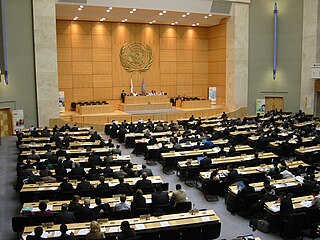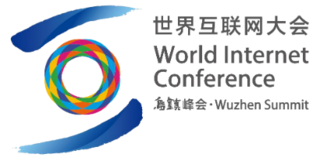Related Research Articles

The World Summit on the Information Society (WSIS) was a two-phase United Nations-sponsored summit on information, communication and, in broad terms, the information society that took place in 2003 in Geneva and in 2005 in Tunis. One of its chief aims was to bridge the global digital divide separating rich countries from poor countries by spreading access to the Internet in the developing world. The conferences established 17 May as World Information Society Day.
The Munich Security Conference is an annual conference on international security policy that has taken place in Munich, Bavaria since 1963. Former names are Wehrkundetagung and Münchner Konferenz für Sicherheitspolitik. It is the world's largest gathering of its kind.

Internet governance is the development and application of shared principles, norms, rules, decision-making procedures, and programs that shape the evolution and use of the Internet. This article describes how the Internet was and is currently governed, some of the controversies that occurred along the way, and the ongoing debates about how the Internet should or should not be governed in the future.

The Internet Governance Forum (IGF) is a multistakeholder governance group for policy dialogue on issues of Internet governance. It brings together all stakeholders in the Internet governance debate, whether they represent governments, the private sector or civil society, including the technical and academic community, on an equal basis and through an open and inclusive process. The establishment of the IGF was formally announced by the United Nations Secretary-General in July 2006. It was first convened in October–November 2006 and has held an annual meeting since then.
Cybersecurity standards are techniques generally set forth in published materials that attempt to protect the cyber environment of a user or organization. This environment includes users themselves, networks, devices, all software, processes, information in storage or transit, applications, services, and systems that can be connected directly or indirectly to networks.

The International Union of Forest Research Organizations (IUFRO) is a non-profit, non-governmental international network of forest scientists, headquartered in Austria. The organization unites over 15,000 scientists in about 700 Member Organizations from more than 127 countries.

Jeff Moss, also known as Dark Tangent, is an American hacker, computer and internet security expert who founded the Black Hat and DEF CON computer security conferences.

Marina Kaljurand is an Estonian politician who served as Minister of Foreign Affairs in Taavi Rõivas' second cabinet as an independent. Earlier, she served as the Ambassador of Estonia to the United States, Russia, Mexico, Canada, Kazakhstan, and Israel.

The 2012 Nuclear Security Summit was a summit held at the COEX Convention & Exhibition Center in Seoul, South Korea, on March 26 and 27, 2012. It was the second time the conference was held after the 2010 Nuclear Security Summit.
Supply chain cyber security refers to efforts to enhance cyber security within the supply chain. It is a subset of supply chain security and is focused on the management of cyber security requirements for information technology systems, software and networks, which are driven by threats such as cyber-terrorism, malware, data theft and the advanced persistent threat (APT). Typical supply chain cyber security activities for minimizing risks include buying only from trusted vendors, disconnecting critical machines from outside networks, and educating users on the threats and protective measures they can take.
There is no commonly agreed single definition of “cybercrime”. It refers to illegal internet-mediated activities that often take place in global electronic networks. Cybercrime is "international" or "transnational" – there are ‘no cyber-borders between countries'. International cybercrimes often challenge the effectiveness of domestic and international law and law enforcement. Because existing laws in many countries are not tailored to deal with cybercrime, criminals increasingly conduct crimes on the Internet in order to take advantages of the less severe punishments or difficulties of being traced. No matter, in developing or developed countries, governments and industries have gradually realized the colossal threats of cybercrime on economic and political security and public interests. However, complexity in types and forms of cybercrime increases the difficulty to fight back. In this sense, fighting cybercrime calls for international cooperation. Various organizations and governments have already made joint efforts in establishing global standards of legislation and law enforcement both on a regional and on an international scale. China–United States cooperation is one of the most striking progress recently, because they are the top two source countries of cybercrime.

The Post-2015 Development Agenda was a process from 2012 to 2015 led by the United Nations to define the future global development framework that would succeed the Millennium Development Goals. The new framework, starting from 2016 is called Sustainable Development Goals.

The Sustainable Development Goals (SDGs) or Global Goals are a collection of 17 interlinked goals designed to be a "blueprint to achieve a better and more sustainable future for all". The SDGs were set in 2015 by the United Nations General Assembly and are intended to be achieved by the year 2030. They are included in a UN Resolution called the 2030 Agenda or what is colloquially known as Agenda 2030.
National Cyber Security Policy is a policy framework by Department of Electronics and Information Technology (DeitY) It aims at protecting the public and private infrastructure from cyber attacks. The policy also intends to safeguard "information, such as personal information, financial and banking information and sovereign data". This was particularly relevant in the wake of US National Security Agency (NSA) leaks that suggested the US government agencies are spying on Indian users, who have no legal or technical safeguards against it. Ministry of Communications and Information Technology (India) defines Cyberspace as a complex environment consisting of interactions between people, software services supported by worldwide distribution of information and communication technology.
Habitat III, the United Nations Conference on Housing and Sustainable Urban Development, took place in Quito, Ecuador, from 17 – 20 October 2016.

The World Internet Conference, also known as the Wuzhen Summit, is an annual international event, first held in 2014, organized by government agencies in China to discuss global Internet issues and policies.
The President's Commission on Enhancing National Cybersecurity is a Presidential Commission formed on April 13, 2016, to develop a plan for protecting cyberspace, and America's economic reliance on it. The commission released its final report in December 2016. The report made recommendations regarding the intertwining roles of the military, government administration and the private sector in providing cyber security. Chairman Donilon said of the report that its coverage "is unusual in the breadth of issues" with which it deals.
The Internet & Jurisdiction Policy Network, also known as "I&J Policy Network", "Internet & Jurisdiction, or simply "I&J", is the multistakeholder organization fostering legal interoperability in cyberspace. Its Secretariat facilitates a global policy process between key stakeholders to enable transnational cooperation and policy coherence. Participants in the Policy Network work together to preserve the cross-border nature of the Internet, protect human rights, fight abuses, and enable the global digital economy. Since 2012, the Internet & Jurisdiction Policy Network has engaged more than 300 key entities from different stakeholder groups around the world, including governments, the world's largest Internet companies, the technical community, civil society groups, leading universities and international organizations.
Internet universality is a concept and framework adopted by UNESCO in 2015 to summarize their positions on the Internet. The concept recognizes that "the Internet is much more than infrastructure and applications, it is a network of economic and social interactions and relationships, which has the potential to enable human rights, empower individuals and communities, and facilitate sustainable development. The concept is based on four principles stressing the Internet should be Human rights-based, Open, Accessible, and based on Multistakeholder participation. These have been abbreviated as the R-O-A-M principles. Understanding the Internet in this way helps to draw together different facets of Internet development, concerned with technology and public policy, rights and development."
Energy diplomacy is a form of diplomacy, and a subfield of international relations. It is closely related to its principal, foreign policy, and to overall national security, specifically energy security. Energy diplomacy began in the first half of the twentieth century and emerged as a term during the second oil crisis as a means of describing OPEC's actions. It has since mainly focused on the securitization of energy supplies, primarily fossil fuels, but also nuclear energy and increasingly sustainable energy, on a country or bloc basis.
References
- 1 2 "About the Global Conference on CyberSpace 2015" . Retrieved June 28, 2015.
- ↑ ""What is the Global Conference on Cyberspace?" FAQs on the GCCS, The Hague, 16-17 April 2015" . Retrieved June 28, 2015.
- ↑ "Cyber4All: A Secure and Inclusive Cyberspace for Sustainable Development" . Retrieved 20 March 2018.